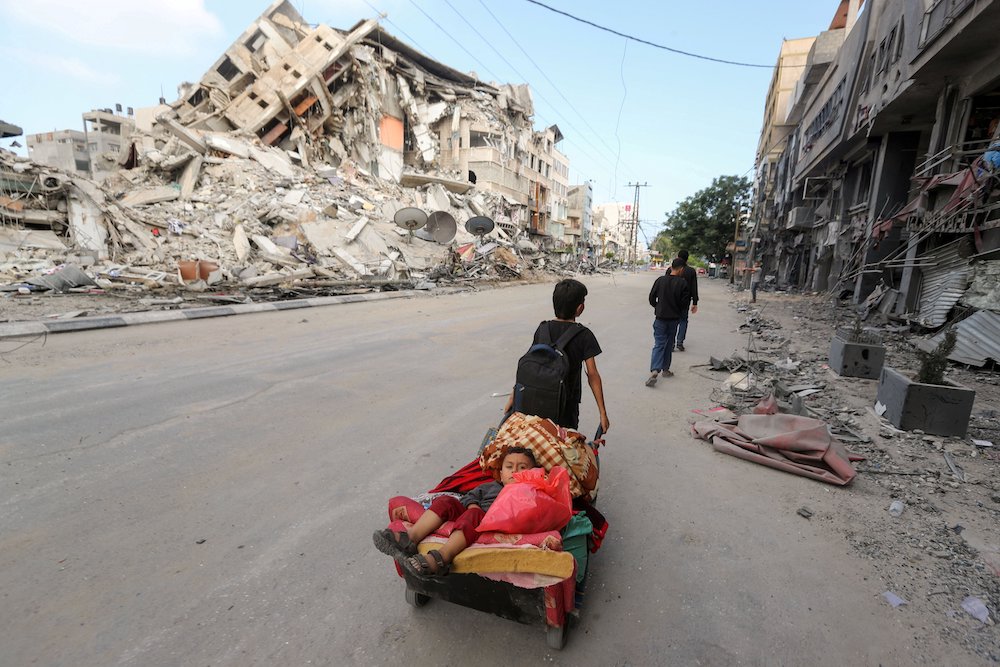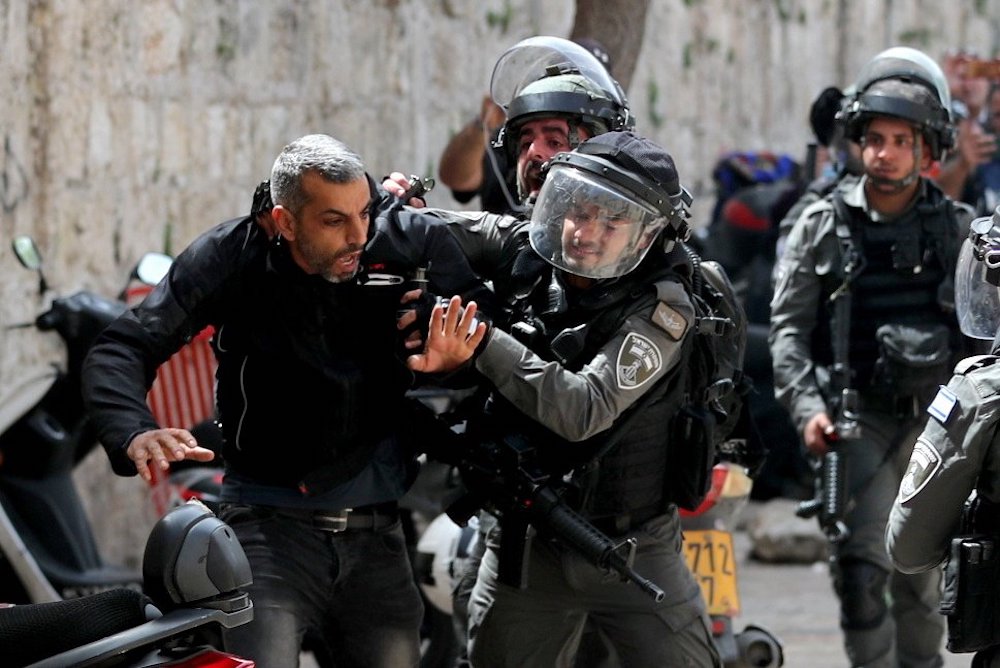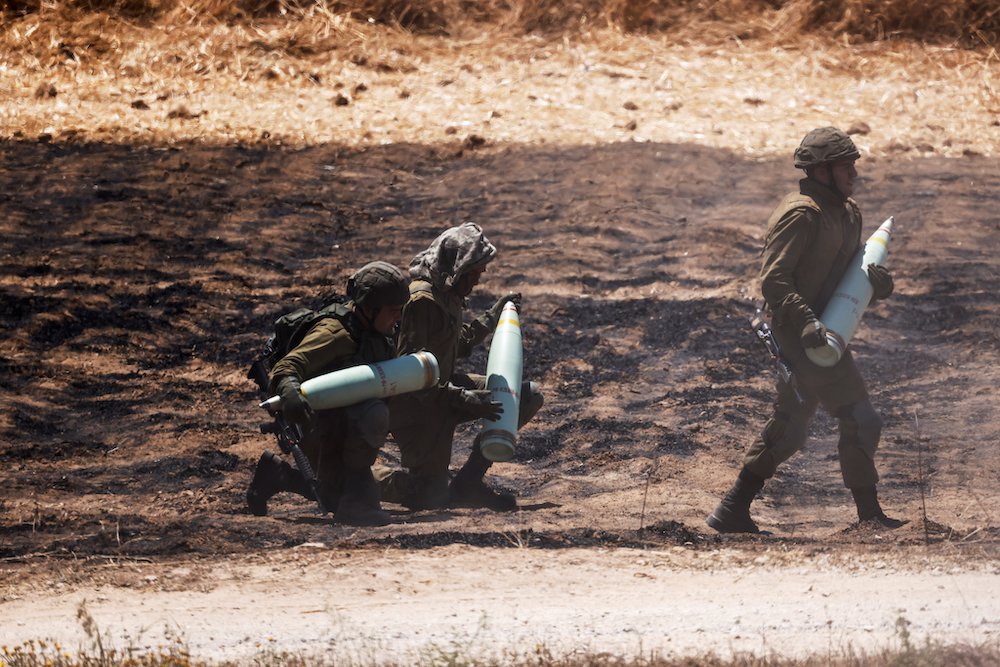
A Palestinian boy pulls a cart carrying his brother and their belongings May 14, 2021, as they flee their home during Israeli air and artillery strikes in Gaza City. (CNS/Reuters/Mohammed Salem)
Violence ripping through Israel, Gaza and the occupied territories will not likely end anytime soon, says a Comboni missionary sister with a long history of experience in the Middle East.
"The situation here is very critical, and there are no signs of improvement," said Sr. Alicia Vacas Moro, a Spanish missionary whose ministry has focused on humanitarian needs in the Middle East, in a May 14 email. "On the contrary. We need to pray for peace and justice in this land, holy and bloodied."
In a video interview a day later, Vacas described a week of tension, violence and unrest in which she and members of her community hear "explosions and shootings all the time" and smell the residual after-effects of rockets, bombs, gunfire and tear gas on the street.
"The neighborhood where I live stinks," said Vacas, whose community is based in a convent in the West Bank community of Bethany, just outside of Jerusalem. Many of the sisters' mission projects — including assisting impoverished Bedouin communities — are either on pause or have slowed, with the sisters being able to do only very limited work right now.
"We try to avoid places that are 'hot,' " she said.
Vacas, who is a registered nurse and regional coordinator for the Comboni Missionary Sisters in the Middle East, reported that she and the five other members of her community are safe, though two of the sisters had to take shelter in a bunker while visiting Tel Aviv last week.
Though all sides in the conflict are taking advantage of the situation, there will have to be a ceasefire at some point, said Vacas, adding that the "underlying situation [of the Israeli occupation] must be solved."
"The people are suffering," said Vacas, recently honored as one of 14 women receiving the U.S. Department of State's annual International Women of Courage Award.
What worries Vacas most as the fighting between Israelis and Palestinians moves into a second week is the situation in the Palestinian-run area of Gaza, where the ruling militant group Hamas is based. Hamas has fired rockets into Israel, prompting Israeli air strikes that Israel says are justified on the grounds of self-defense.
On May 15, the conflict escalated when the Israeli military targeted and destroyed a building housing the offices of the Associated Press news service, Al Jazeera news and other media operations in Gaza City, the AP reported.
Those in the building were warned an hour in advance to evacuate. The Israeli military claimed that Hamas was operating within the building, the AP reported, and the AP condemned the bombing, as did the New York-based Committee to Protect Journalists.
"This latest attack on a building long known by Israel to house international media raises the specter that the Israel Defense Forces is deliberately targeting media facilities in order to disrupt coverage of the human suffering in Gaza," said CPJ Executive Director Joel Simon.
Vacas is similarly concerned that the bombing will make it harder for journalists to cover events in Gaza, which has long faced a dire humanitarian situation. (A small Catholic community lives in Gaza, with a parish headed by Fr. Gabriel Romanelli, who was recently interviewed in Italian about the situation in Gaza.)
Advertisement
"Gaza was a stressful place to live" even before the recent events, Vacas said, recalling visits she made to the territory in 2009 and 2014, noting that the high population density makes it nearly impossible for civilians to flee from military incursions.
"It's packed; there's no place to go," she said, folding her hands together to prove the point. "People are literally like in a box."
Vacas prays that Israeli forces will not invade Gaza, both because of the possible "physical amputation" — deaths and injuries — that could inflict civilians in Gaza but also the "moral amputation" for members of the Israeli military should events "push them to a level of brutality." The same could happen to young Palestinians who respond with violence, she said.
But civilians are already dying — in Gaza, in the occupied territories and in Israel. On Sunday, the Reuters news agency reported Palestinians saying that at least 145 people in their areas have been killed since the conflict began last week, on May 10. That includes 41 children, Reuters reported. Israel, meanwhile, reports 10 dead, including two children.
Vacas and members of her community were not surprised by the "cycle of violence," she said, noting in some ways it was predictable given the sensitivities of the situation. "It's a long cycle, and we knew something would happen," comparing it to "shaking a bottle of Coca-Cola" — with obvious and unwelcome results.
"We knew we were not going in the right direction," she said. "We knew the situation was getting worse and worse."
But why this moment now?

A Palestinian man clashes with Israeli police outside Al-Aqsa Mosque in the Old City of Jerusalem May 10, 2021. (CNS/Reuters/Ammar Awad)
In a May 15 article, Patrick Kingsley, the Jerusalem bureau chief for The New York Times wrote the crisis may have started with an Israeli police raid on the landmark Al-Aqsa mosque in Jerusalem on April 13 — the first night of the Muslim holy month of Ramadan. That event then spiraled "as the Israeli government was struggling for its survival; as Hamas — which Israel views as a terrorist group — was seeking to expand its role within the Palestinian movement; and as a new generation of Palestinians was asserting its own values and goals."
And, Kingsely wrote, "it was the outgrowth of years of blockades and restrictions in Gaza, decades of occupation in the West Bank, and decades more of discrimination against Arabs within the state of Israel, said Avraham of Burg, a former speaker of the Israeli Parliament and former chairman of the World Zionist Organization."
Vacas agrees that the situation with the mosque "was a dangerous step" and added there were other key elements: continued evictions of Palestinian residents from neighborhoods in East Jerusalem and clashes at the disputed Damascus Gate, a large plaza. A decision by Israel police to close off the stairs to the gate during Ramadan turned the area into a scene of battle, the Israeli newspaper Haaretz reported, with "large numbers of police officers, including mounted ones, wielding water cannons to disperse gatherings at the site."
Vacas said it is true that Hamas has used the events for its own purposes. But she recalls a telling incident during the last week when she expressed frustration about Hamas with a Palestinian woman, a cook, who works in the sisters' compound. The woman told Vacas, "They [Hamas] are the only ones fighting for us."

Israeli soldiers carry artillery shells in a field next to their unit on the Israeli side of the border between Israel and the Gaza Strip May 14, 2021. (CNS/Reuters/Amir Cohen)
That speaks of continued Palestinian frustration, Vacas said — frustration and anger that must be addressed both in the short term and the long term.
Vacas pointed to a declaration by Archbishop Pierbattista Pizzaballa, the Latin Patriarch in Jerusalem, who in a May 9 statement said the church "has been clear that peace requires justice. Insofar as far as the rights of everyone, Israelis and Palestinians, are not upheld and respected, there will be no justice and therefore no peace in the city. It is our duty not to ignore injustice nor any aggression against human dignity regardless of who is committing them."
Pizzaballa called upon the international community, churches "and all people of goodwill to intervene in order to put an end to these provocative actions, and to continue to pray for the peace of Jerusalem."
In the spirit of peace present during the season of Pentecost, Vacas said she has to believe that, eventually, some sort of peace will come to the Holy Land. "It's important for us to pray," she said.
"We are called to hope and be witnesses to hope," she said. "We know life is stronger than death. But it's a challenge right now to make it happen."







